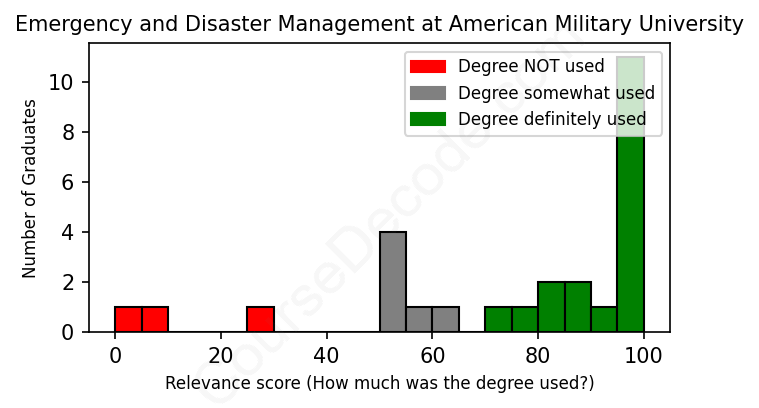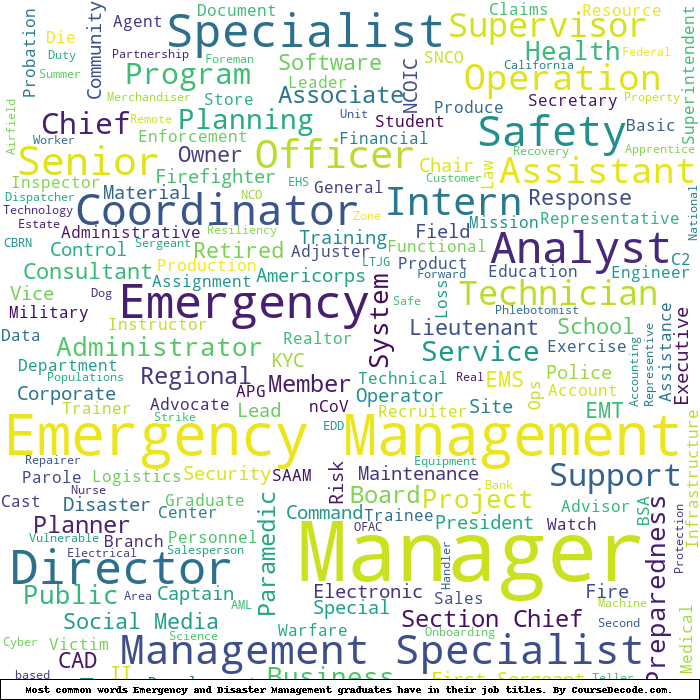
First, some facts. Of the Emergency and Disaster Management graduates from American Military University we've analyzed , here's how many have used (or NOT used) their degree in their career:

These are estimates based on AI analysis of 27 LinkedIn profiles (see below).
The verdict? Above average. Overall, with an average relevance score of 75%, Emergency and Disaster Management graduates from American Military University have a higher likelihood (+8%) of finding work in this field compared to the average graduate across all fields:
And for comparison, here's the chart for all profiles we've looked at across all degrees.
Also, after graduating, 37% of these graduates have pursued further education other than another Bachelor's degree (such as a Masters degree or other), compared to the average across all profiles of 35%. This suggests you may need more than just a Bachelors degree to be competitive as a Emergency and Disaster Management graduate.
See the details:
|
Relevance score: 100% We think this person has gone into a career highly relevant to their degree. We think this person has gone into a career highly relevant to their degree.
DEGREE INFOGraduated in 2016 from American Military University with a Bachelor of Arts - BA in Emergency and Disaster Management. Also pursued further education since (see below). JOB HISTORY SINCE GRADUATIONNCOIC, C2 Ops Systems United States Air Force Sep 2016 - Jan 2021 NCOIC, C2 Ops  United States Air Force Jan 2021 - Mar 2022 ACC/IG Command & Control Inspector  United States Air Force Mar 2022 - Present FURTHER DEGREES DONE SINCE GRADUATINGMaster of Business Administration - MBAAmerican Military University 2016 - 2019 Doctor of Strategic Leadership Liberty University 2019 - 2023 Graduate Certificate Liberty University 2019 - 2021 ABOUTExperienced leader with over 16 years of experience working in the Military Industry. I leverage years of proven experience in building exceptional interpersonal relationships, a high level of initiative, team leading, shaping organizational cultures, process improvement, and a commitment to excellence and development. My strengths are peer development, operations management, strategic planning, team motivation, and exceptional leadership. As I slowly begin to transition from the United States Air Force, I am looking to make connections in Project Management and Management Consulting. Awarded Doctor of Strategic Leadership from Liberty University.DISCLAIMER: The views presented on this account are those of the account owner and do not necessarily represent the views of Department of Defense, the Joint Staff or its components. |
The top 10 most common jobs done by the graduates we've analyzed (ranked most common to least) are:
After looking at the careers of people who graduated with a degree in Emergency and Disaster Management from American Military University, it’s clear that many of them have taken on roles that are pretty closely related to what they studied. The most common jobs include positions like Emergency Management Coordinator, Emergency Services Manager, and various specialist roles at organizations like FEMA and the CDC. These positions typically require the graduates to apply their knowledge in real-world settings, tackling issues from disaster response to safety planning. You’ll also see a good number of paramedics and firefighters in the mix, which makes sense because those roles are all about emergency response.
However, not every job on the list is directly relevant to their degree. Some folks have drifted into positions that focus more on general operational duties or human resources, which don’t rely heavily on the specific knowledge gained from their studies. For example, roles like HR Specialist or Operations Manager may involve some aspects of crisis management but don’t directly utilize the emergency management skills they learned. Overall, while many graduates find jobs that are right in line with their education, there are also quite a few who end up in positions that are only tangentially related to Emergency and Disaster Management. It’s a mixed bag, but there’s definitely a solid core of graduates working in fields that tap into their expertise directly.
Here is a visual representation of the most common words in job titles for Emergency and Disaster Management graduates (this is across all Emergency and Disaster Management graduates we've analyzed, not just those who went to American Military University):

Based on the LinkedIn profiles of graduates from American Military University with a degree in Emergency and Disaster Management, it seems like many of them have followed a pretty solid career path in fields relevant to their studies. Typically, right after graduation, we see them landing entry-level roles like internships or coordinator positions. For example, one graduate worked as an Emergency Response and Safety Intern before moving up to a Graduate Advisor in safety and health work. This kind of progression isn't uncommon, and it reflects a strong foundation in the emergency management field straight out of university.
Looking five to ten years down the line, most of these professionals have continued to ascend in their careers, landing more senior roles like Emergency Services Managers, Directors, or even specific positions in agencies like FEMA or the U.S. Coast Guard. Some have transitioned into specialized roles, including firefighters or EMTs, and others have climbed the ranks in public health and safety departments. Overall, these graduates seem to find rewarding careers directly tied to Emergency and Disaster Management, avoiding the issue of being stuck in unrelated jobs. So, if you’re considering this field, it looks like there are plenty of opportunities to build a successful and relevant career!
Getting a Bachelor’s degree in Emergency and Disaster Management can be a mix of challenging and manageable, depending on how you approach it. At American Military University specifically, the coursework is designed to give you a solid understanding of emergency protocols, crisis management, and public safety, but it’s not overly intense compared to some other degrees. You’ll have to do your fair share of reading, writing essays, and probably some group projects, but it’s generally considered more accessible than, say, engineering or advanced sciences. If you stay organized and engage with the material, you can make it through without feeling too overwhelmed—just be ready to put in some effort!
Most commonly, in the LinkedIn profiles we've looked at, it takes people 2 years to finish a Bachelor degree in Emergency and Disaster Management.
Looking at the job history of these Emergency and Disaster Management graduates from American Military University, it seems like many of them have landed solid positions that can pay decently. For instance, roles like Emergency Management Coordinators and Directors of Public Safety typically come with good salaries, especially as they gain more experience. Plus, some have climbed the ranks in organizations like the United States Air Force and Secret Service, which usually means they’re making a strong paycheck. However, not every position has the same earning potential; for example, roles like paramedics might be on the lower end salary-wise. Overall, it seems like most of these folks have found decent-paying jobs, especially as they’ve advanced in their careers.
Here is a visual representation of the most common words seen in the "about" section of LinkedIn profiles who have a Bachelor degree in Emergency and Disaster Management (this is across all Emergency and Disaster Management graduates we've analyzed, not just those who went to American Military University). This may or may not be useful:

Here are all colleges offering a Bachelor degree in Emergency and Disaster Management (ordered by the average relevance score of their Emergency and Disaster Management graduates, best to worst) where we have analyzed at least 10 of their graduates:
| College | Score | Count |
|---|---|---|
 American Military University American Military University
|
75 | 27 |